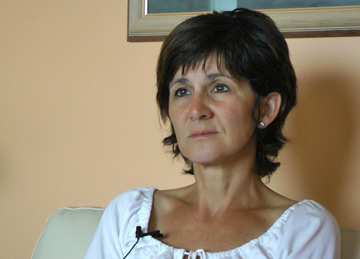Fernanda

Cares for her mother
Age at interview: 49
Age at start of caregiving: 37
Fernanda (49 years old) is married and lives in a city in Saskatchewan. She works full-time and visits her mother frequently in the long-term care facility where she lives. Fernanda’s mother (80 years old) was diagnosed with renal failure about 12 years ago. She requires dialysis three times a week and, due to other accidents, lives with persistent pain. Fernanda always accompanies her mother for her dialysis sessions.
When Fernanda and her parents immigrated to Canada and went through stringent medical tests they found out that her mother had chronic renal failure. Six years after this diagnosis, Fernanda’s mother had to go on dialysis and the doctors expected her to live for only two more years. She had a kidney transplant one year after the start of dialysis but then developed several medical problems associated with the transplant. During this period, Fernanda’s father died of a heart attack. Her father had heart problems before but also being a caregiver added to the stress.
From then on, Fernanda had to combine her full-time job with her mother’s care, including the dialysis and her regular care. Her days consisted of being a caretaker at home, going to work, going back home during the day to attend to her mother’s needs and picking her mother up from dialysis three times a week. It was too stressful for Fernanda to combine her work and care as many of the tasks were often to be performed concurrently during the day.
It was only after her mother had a serious fall that Fernanda accepted that her mother could no longer remain at home and arrangements were made for her to go to an independent living care facility. This situation lasted for seven years until Fernanda felt she needed to change to a long term care facility after another fall. Fernanda then had to advocate strongly with the health care professionals for her mother to be placed in a long term care facility. This was one of the toughest things she had done in her life by accepting and indicating clearly to others that she was no longer able to continue to care for her mother in such a way. A significant turning point for Fernanda was when an emergency room doctor told her that she had done enough and that it was now time to let other people take care of her mother. She is still grateful to this doctor for making this decision, which made it easier for Fernanda to move her mother to a long-term care facility. Fernanda explains that she has often been able to find excellent medical services for her mother but that she also remembers with sadness the times when she felt the services were not responding to her mother’s needs.
In spite of all the trials and tribulations with her mother’s illness and care, what affects Fernanda the most is to see her mother suffering from continuous pain caused by several broken bones and a dislocated shoulder that can no longer be operated on. Fernanda’s caregiving has not remained limited to her own mother. She finds it painful to see elderly people left alone and tries to contribute to their lives by volunteering in her mother’s long-term care facility and in the hospital’s patient group. She also sits on two patient/family advisory boards for a Health Region in Saskatchewan. Notwithstanding her own challenges with caregiving, Fernanda has become part of a larger caring network.
More content
- Travelling, holidays and respite – FernandaWhen Fernanda is hiking in the mountains, there is no cell reception. Although she feels guilty, being unavailable is a relief.
- Hospitals and facilities – FernandaFernanda found good support from the client advocacy office, when her mother was in great pain without any specific treatment for it.
- Challenging emotions and feelings – Fernanda (2)When Fernanda’s mother went into a facility, Fernanda felt like she was betraying and abandoning her.
- Challenging emotions and feelings – FernandaFernanda’s social worker was a big help: she assured her that her negative feelings were normal.
- Effects of care recipients’ behaviour – FernandaFernanda appreciates her mother’s endurance and attitude. Nonetheless, it is sometimes difficult when she relies mostly on Fernanda and refuses other help that is offered to her.
- Caring for yourself – FernandaFernanda learned that you need to have time for fun. Still, it can be hard to take time for herself.
- Impact on professional life and career – FernandaFernanda asks employers to put themselves in the caregivers’ shoes; it is really hard to balance care and work.
- Impact on health – FernandaA social worker helped Fernanda find the skills she needs to cope with her situation.
- Providing support – FernandaThe toughest thing that Fernanda did was tell the doctors that she wasn’t able to care for her mother anymore at home.
- Society and caregiving – FernandaFernanda thinks it would be wonderful if people knew more about what it means to be a caregiver.